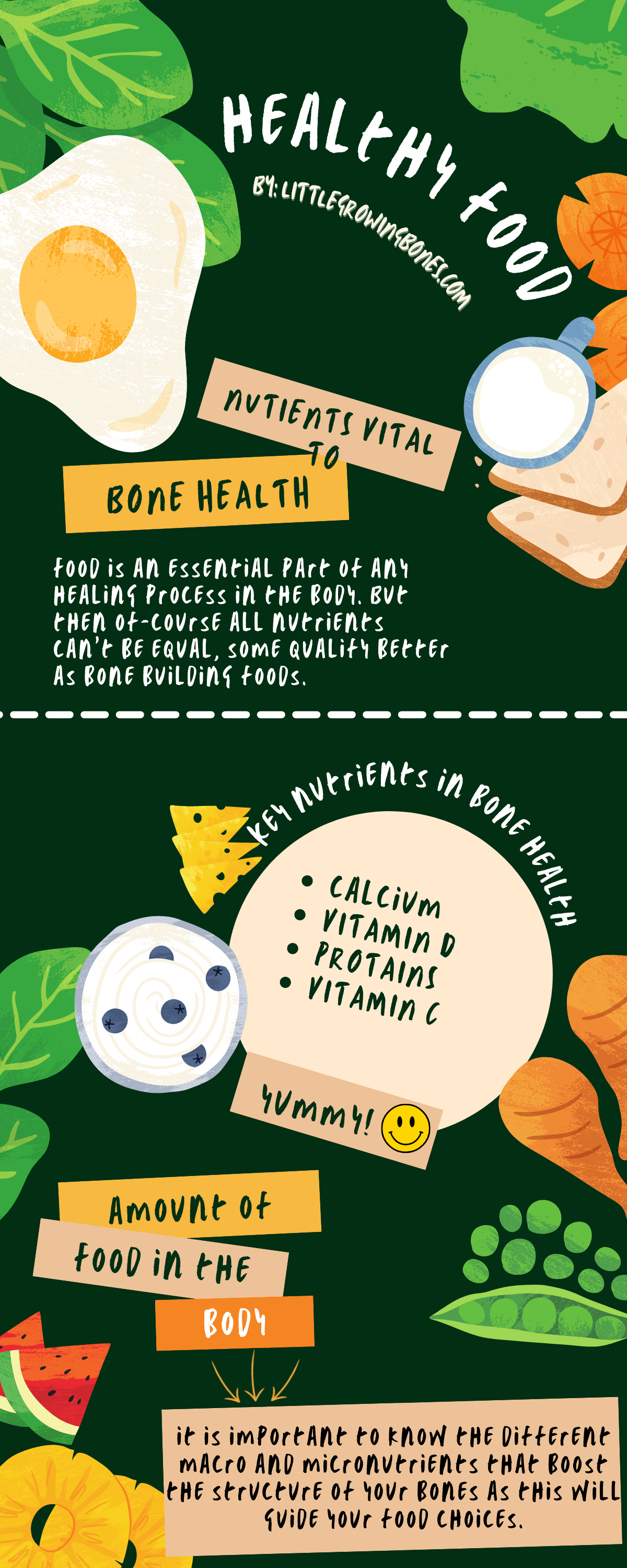Food is an essential part of any healing process in the body. This is because it is through food that your body is able to receive the macronutrients and micronutrients that are important for the complex bodily reactions.
But then of-course all nutrients can’t be equal, some qualify better as bone building foods.
Key nutrients in bone health
- Calcium
We need an optimum calcium intake at all stages of life in-order to have healthy bones. This is an important nutrient and is a major building block for bone.
70% of bone is made up of mineral of which 95% of that is hydroxyapatite which is a complex structure comprising of calcium and phosphate. Calcium makes up a large percentage of the bone and like we were told as children, calcium makes your bones stronger.
For most adults, the recommended dietary allowance for calcium varies between 700 to 1200mg/day
Sources of calcium are numerous but the most common include; dairy products like milk, yorghut and cheese,fish, fortified cereal and flour, tofu , greens like kale, broccoli, chia seeds plus some fruits like pawpaws and blackberries.
Calcium can also be received as supplements and the most common modalities are calcium carbonate and calcium citrate.

Do you need to see a paediatric orthopaedic surgeon?
2. Vitamin D
Vitamin D vitamin is very important as it facilitates the calcium that we take in as foot or supplements to be moved to bone, otherwise we would eat food rich in calcium and then pass it out the way we took it in.
Therefore, Vitamin D ensures that the calcium you take in though your food gets absorbed from the intestines.
Vitamin D is available as ergocalcoferol (vitamin D2) Which is derived from plants or as cholecalciferol (vitamin D3) which is from animal sources.
The exposure to the sunlight stimulates a chemical reaction in the skin that leads to production of previtamin D, which later will be used to form Vitamin D3.
The recommended daily intake of vitamin D for an normal adult under 70 years is approximately 600iu. However in individuals over 70years or those with osteoporosis, the required daily intake may be as high as 1000 to 1400iu
Sources of vitamin d include sunlight, eggs and some types of fish like salmon and Tuna, fish liver oil plus other foods fortified with Vitamin D.
3. Protein
All our body cells comprise of protein. Protein makes up about 50% of the volume of bone. Protein is very important during the repair of bone and other tissues.
In order to maintain good muscle mass, its important to have adequate daily protein intake. Muscle is one of the major channels through which blood gets to bone.
The recommended daily intake of protein for healthy adults is 1.2 to 1.5g/kg per day of good quality protein in order to preserve muscle function. Athletes are expected to have an intake of approximately 1.83g/kg daily.
Foods rich in protein include; meat, fish, legumes like beans, soy, peas, nuts, dairy products.

4. Vitamin c
Vitamin c is a valuable co-factor for the formation of collagen, a protein that’s of paramount importance in the structure of bone and it has been shown that deficiency of vitamin C leads to impaired bone mass.
In-addition, vitamin C is a strong antioxidant and its absence exposes bone to oxidative stress which may increases bone resorption.
The recommended daily intake of vitamin C for adults is 65 to 90 milligrams
Foods with vitamin c include; fruits, bell papers (red, yellow and green), onions etc
Conclusion
In conclusion, it is important to know the different macro and micronutrients that boost the structure of your bones as this will guide your food choices.
